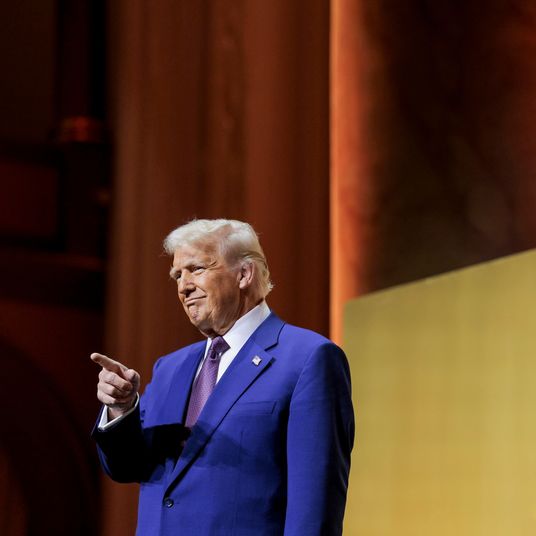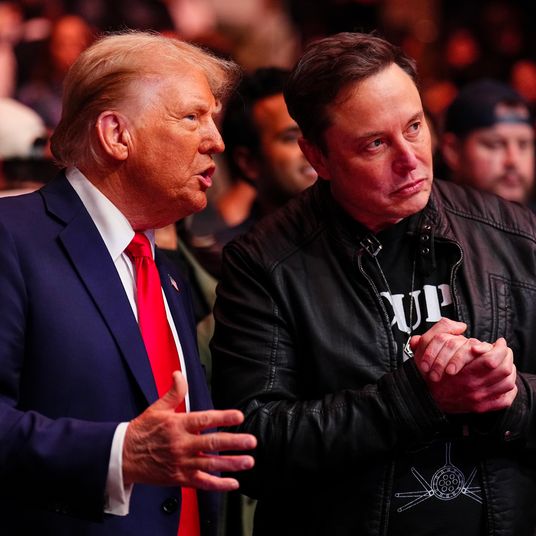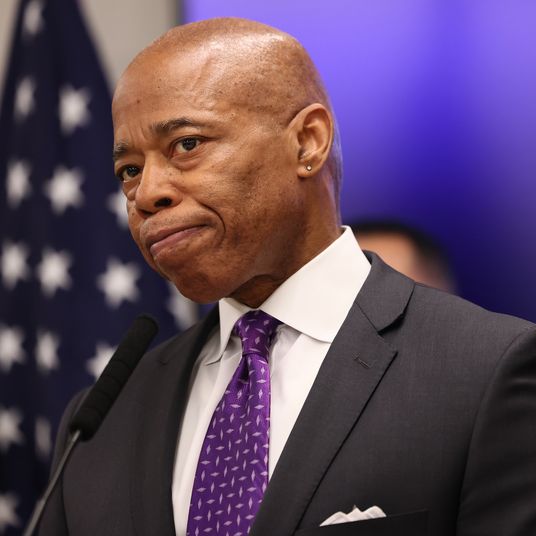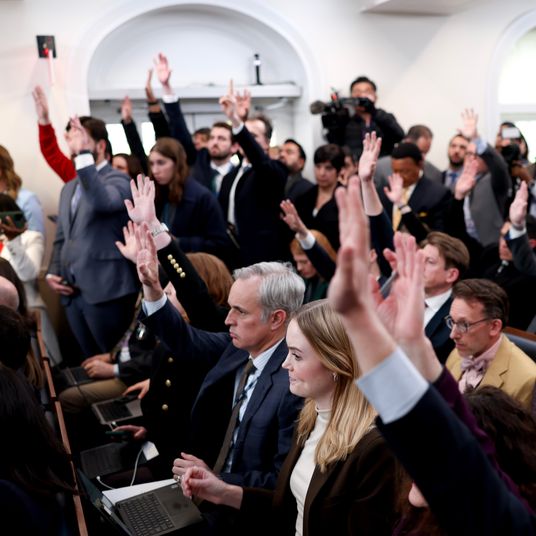
Amid the chaos of federal hiring freezes, grant freezes, the wild DOGE effort to arbitrarily slash federal payrolls and cancel programs and contracts, and congressional Republican efforts to cut trillions of dollars in spending to pay for tax cuts, you frequently hear that Americans are getting what they said they wanted in November. Even if you laugh, which you almost have to do, at Donald Trump’s absurd claims of an incredible, unprecedented landslide victory and an unlimited mandate to do anything he wants, laws be damned, there remains an underlying sense that he told voters what he’d do and they either supported it or weren’t paying attention.
Trouble is it’s just not true. Yes, he promised the mass deportation of undocumented immigrants (which has barely begun), pledged to melt down the polar caps with a “drill, baby, drill” energy policy, and made it pretty clear any sort of anti-discrimination efforts are as doomed as U.S. support for Ukraine. He told voters a lot of things; some of it was dead serious, and other bits were probably for entertainment value. But he did not promise a slash-and-burn austerity budget and a radically downsized federal government. And he certainly didn’t reveal that he would give his campaign’s chief funder personal power to take over federal agencies and terrorize their personnel, mugging and laughing like a cartoon villain the whole time.
There were 20 planks in the Trump-Vance 2024 campaign platform. None of them involved gutting the federal budget and firing tens or hundreds of thousands of federal employees. Plank No. 6 promises “large tax cuts for workers, and no tax on tips!” but says nothing about the high-end and corporate tax cuts Trump is now pushing or, even more crucially, how to pay for them. Plank No. 9 pledges to “end the weaponization of the government against the American people” (a pretty clear hint that the new administration regards Trump supporters and only Trump supporters as “the American people”). Perhaps that suggests forced turnover in the Department of Justice, but nowhere else. Plank No. 15 pledges to “cancel the electric car mandate and cut costly and burdensome regulations,” but again, this is a million miles away from reductions across federal agencies. Plank No. 16 calls for ending “federal funding for any school pushing critical race theory, radical gender ideology, and other inappropriate racial, sexual, or political content on our children.” Instead of this very specific pledge, we’re getting a governmentwide demolition of anything related to gender or race and the firing of any employees who dare utter a list of ideologically forbidden words. There’s nothing remotely resembling DOGE, the Office of Management and Budget’s effort to wrest the spending power away from Congress, or the radical shifts in resource allocations necessary to implement a radical federal budget by Congress.
Was there anything like what we are now seeing in the Republican National Convention platform, which is a more detailed version of the Trump campaign one? There is this one sentence in the section on inflation: “Republicans will immediately stabilize the Economy by slashing wasteful Government spending and promoting Economic Growth.” Okay, that’s in the ballpark, but every candidate in either party opposes “waste.” That doesn’t suggest the arbitrary $2 trillion savings goal Musk has advanced or the $1.5 to $2 trillion of spending cuts contained in the draft House budget resolution under consideration right now. For the most part, the party platform (and Trump’s campaign rhetoric) suggests that “unleashing” energy production is the real key to controlling inflation and growing the economy. And the document includes both a variety of new spending initiatives and redundant promises to leave Social Security and Medicare alone (Medicaid is not mentioned in either the campaign or party platforms).
How about Trump’s own utterances? His acceptance speech in Milwaukee was a 90-minute presentation of his case for returning to the White House. Again, there was no real hint that massive federal spending cuts would be deployed to deal with inflation or reduce budget deficits; instead, Trump plainly said wildly increased energy production would slay inflation and that tax cuts would pay for themselves through increased growth. In accordance with his focus on energy policy, Trump did make one specific spending cut promise: “They’ve spent trillions of dollars on things having to do with the Green New Scam. It’s a scam … And all of the trillions of dollars that are sitting there not yet spent, we will redirect that money for important projects like roads, bridges, dams and we will not allow it to be spent on the meaningless Green New scam ideas.” So yes, he did warn us about that, though again, there was no sense that federal spending was at crisis levels requiring radical austerity budgeting; it was more a matter of spending being directed to ideologically unacceptable goals.
Trump and his campaign spilled many millions of words via speeches, ads, and surrogate appearances without giving any real indication that a pre-Trump tea-party-style attack on federal spending, programs, and personnel was in the offing. But you know who did provide some pretty clear warning signs of the chaos to come? The Heritage Foundation’s Project 2025 blueprint.
Indeed, one of the four major “promises” addressed in Project 2025’s main report (Mandate for Leadership: The Conservative Promise) is “Dismantle the administrative state and return self-governance to the American people.” The foreword to this document argues for executive-branch usurpation of congressional authority over federal spending with this justification of power grabs to come: “The Administrative State holds 100 percent of its power at the sufferance of Congress, and its insulation from presidential discipline is an unconstitutional fairy tale spun by the Washington Establishment to protect its turf.” Russell Vought, now director of the Office of Management and Budget, penned a chapter on the office of the president that treats as paramount the goal to “bend or break the bureaucracy to the presidential will” by any means possible. A subsequent chapter on “Managing the Bureaucracy” calls bluntly for an end to the civil-service system as we have known it, and other chapters envision radical reductions in federal involvement in domestic-governance areas ranging from education to housing to transportation. The entire document faithfully reflects a pre-Trump conservative austerity agenda as old as the original opposition to the New Deal and as recent as George W. Bush’s and Paul Ryan’s assaults on entitlement programs. But it’s not what Trump campaigned on; indeed, he repeatedly disclaimed any knowledge of or agreement with Project 2025’s work, notably in this July 2024 Truth Social post:
I know nothing about Project 2025. I have no idea who is behind it. I disagree with some of the things they’re saying and some of the things they’re saying are absolutely ridiculous and abysmal. Anything they do, I wish them luck, but I have nothing to do with them.
Yet a Politico analysis of early Trump executive orders found 37 separate Project 2025 recommendations embedded in them, some lifting language directly from its published recommendations.
Much of what the Trump administration is doing right now is an amalgam of Project 2025’s goals achieved initially through the patented chaos tactics of Elon Musk and subsequently by Trump appointees under Russ Vought’s direction. If it can get its act together, the Republican-controlled Congress is expected to rubber-stamp legislation that decimates the federal government in part to finance tax cuts and in part for the sheer ideological hell of it. Some Trump voters may be happy with this massive bait-and-switch, but for others, it will come as a nasty surprise.
More on Politics
- Angry Voters Keep Confronting Republicans Back Home
- All the Drama Around the Trump Movie The Apprentice
- OPM Walks Back Musk’s Mass Email Threat to Federal Workers





























